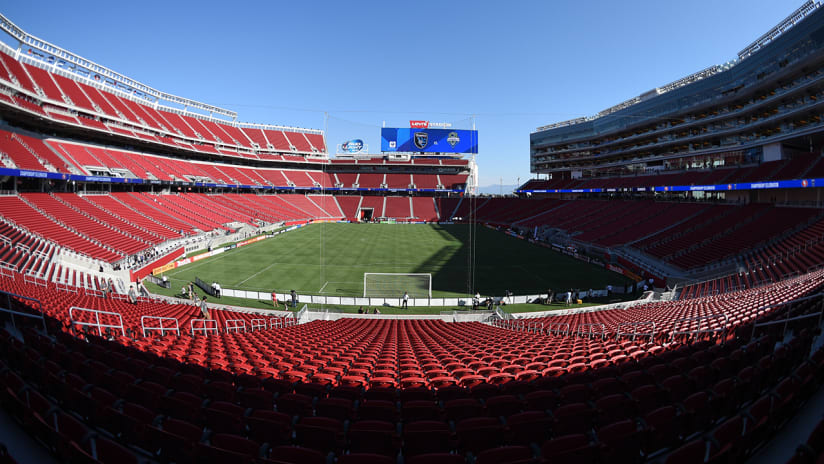SAN JOSE, Calif. - The United Bid Committee announced today the 32 cities across North America that could serve as Official Host Cities for the 2026 FIFA World Cup, including the Bay Area. The 32 potential host cities include four cities in Canada, three in Mexico and 25 cities in the United States. The full list of cities is included below.
"As we move to the next stage of the bid process, we're even more confident we have everything needed to deliver the largest, most compelling FIFA World Cup in history and help accelerate the growth of soccer across North America and around the world," said United Bid Chairman Sunil Gulati. "We have more than double the number of cities required to stage matches in 2026. We have a vision for growing the game and engaging fans as never before. Our biggest challenge will be finding ways to honor the enthusiasm of all the people across Canada, Mexico and the United States through the development of our united hosting concept."
The selection process took into account various factors such as city profile, stadium and support facilities (training sites, hotels) and services (e.g., transportation). The United Bid Committee also looked at ways each city could contribute to a united hosting strategy for the 2026 FIFA World Cup including their contribution to the sport's development and the United Bid's vision - not only during the tournament, but in the eight-year build up and the social, economic and environmental legacy.
Each of the 32 potential host cities features existing or already planned stadiums and other world-class infrastructure, meeting or exceeding the requirements outlined by FIFA. Additionally, the potential host cities reflect the vast geographic and cultural diversity of North America and share a commitment to using the once-in-a-generation opportunity of hosting the FIFA World Cup to welcome, entertain, inspire and empower the next generation of players and fans as never before.
"We received applications from 41 cities across Canada, Mexico and the United States and narrowed the list after a comprehensive review of each of the communities and facilities. The 32 cities that we have identified as potential host cities, on their own and together, are prepared to welcome soccer fans from around the world. They are more than capable of helping fulfill the shared vision and ambition of FIFA and the United Bid in shaping the future of soccer in North America," said Executive Director of the United Bid Committee John Kristick. "While not every city will move forward as a potential host city, we were so impressed by all the applicants that we will continue to engage with all the cities as part of our hosting strategy and we will welcome the opportunity to work with FIFA to further expand our hosting concept to ensure the broadest possible impact for this spectacular event."
During the next stage of the bid process, the United Bid Committee will integrate the 32 potential host cities into the united bid strategy and vision, as well as work with local officials to finalize the hosting documents required by FIFA. Representatives from the 32 potential host cities will travel to Houston, Texas during the week of Nov. 13 for a working session with the United Bid Committee.
The United Bid Committee will also continue engaging with the nine cities that are not advancing to the next stage of the candidate host city process. Those cities, along with others, are being considered as possible locations for team base camps or other competition-related events leading up to the 2026 FIFA World Cup. Further, if entrusted with the 2026 FIFA World Cup, the United Bid Committee plans to work closely with FIFA to explore ways to extend the plans for fan engagement to include all communities across the three host countries - and is already encouraging business and civic leaders, fans and others to contribute their new and innovative ideas to be integrated into the United Bid's hosting concept.
Canada (4)
Edmonton, Alberta
Montréal, Québec
Toronto, Ontario
Vancouver, British Columbia
Mexico (3)
Guadalajara, Jalisco
Mexico City, Mexico
Monterrey, Nuevo León
United States (25)
Atlanta, Georgia
Baltimore, Maryland
Boston, Massachusetts
Charlotte, North Carolina
Cincinnati, Ohio
Chicago, Illinois
Dallas, Texas
Denver, Colorado
Detroit, Michigan
Houston, Texas
Kansas City, Missouri
Las Vegas, Nevada
Los Angeles, California
Miami, Florida
Minneapolis, Minnesota
Nashville, Tennessee
New York/New Jersey
Orlando, Florida
Philadelphia, Pennsylvania
Phoenix, Arizona
Salt Lake City, Utah
San Francisco Bay Area, California
Seattle, Washington
Tampa, Florida
Washington, DC
The following cities were not selected as Host City candidates to be included as part of the United Bid: Birmingham, Alabama; Cleveland, Ohio; Indianapolis, Indiana; Jacksonville, Florida; New Orleans, Louisiana; Ottawa, Ontario; Pittsburgh, Pennsylvania; Regina, Saskatchewan; and San Antonio, Texas.
About the United Bid Committee The United Bid Committee was created by the National Federations of Canada, Mexico and the United States to manage the bidding process for the 2026 FIFA World Cup. Robert Kraft serves as Honorary Chairman of the United Bid Committee Board of Directors. Sunil Gulati is Chairman of the United Bid Committee Board of Directors, which includes representatives of the three North American soccer federations. The Executive Director of the United Bid Committee is John Kristick.
About The 2026 FIFA World Cup The 2026 FIFA World Cup will be the first tournament with the expanded 48-team format and will require world-class facilities and infrastructure to ensure a successful tournament. The United Bid of Canada, Mexico and the United States is uniquely suited to accommodate FIFA's high-level standards for hosting a FIFA World Cup. If the United Bid is selected by FIFA as the host for the 2026 FIFA World Cup, at least 12 cities will be selected as venues for games. Canada, Mexico and the United States also have a long and successful history as hosts - 13 FIFA World Cups have been hosted by Canada, Mexico and the United States, five of which set attendance records.




